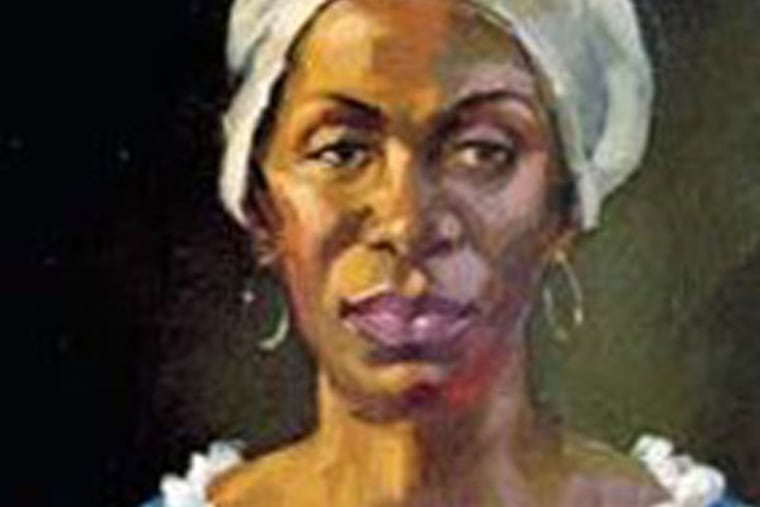Marking Juneteenth with slave's tale
Now-legendary Alice saw three centuries, met William Penn, and believed she had a right to freedom.

She was known variously as Alice, Alice of Dunk's Ferry, Black Alice, or Old Alice.
She was a slave who lived at least 108 years - some say 116 - and saw three centuries.
She never learned how to read or write, and never gained her freedom, but her head was filled with priceless memories.
Alice could tell a story like no one else - whether it was about meeting William Penn, the founder of Pennsylvania; witnessing the early days of Philadelphia; or navigating boats between Dunk's Ferry - now Beverly - and what is now Bensalem.
Over time, she became a revered, almost legendary figure, known not only in America but also in England, Spain, and South America.
On June 20, her inspiring story will be told as part of a sesquicentennial commemoration of Juneteenth, an observance marking the abolition of slavery in Texas in June 1865, and more generally the emancipation of African American slaves.
The free public event will be held from 1 to 3 p.m. in Conklin Hall at St. Stephen's Episcopal Church, 158 Warren St. in Beverly.
Alice "wanted to be free and is an example of other people who wanted their freedom" long before Juneteenth, said Susan E. Klepp, a prizewinning author and retired Temple University history professor who will tell Alice's story at the June 20 event. "She believed she had a right to freedom."
Alice was born in the late 1600s and died in the early 1800s. From age 5 to 10, she worked at a tavern near what is now Independence Hall and was probably about 7 or 8 when, by her own account, she lit the pipe of William Penn, who was a slave owner and then on his second tour of Pennsylvania.
Though she couldn't read, she became familiar with Bible verses that "stressed liberty, freedom, and the end of slavery," said Klepp, who lives in Philadelphia's Andorra section. "So we have that kind of evidence that she was antislavery."
Alice was owned by Sam Carpenter, a friend of William Penn's. She lived in the city until she was 10 and was moved by her master to Bensalem, where she later managed Dunk's Ferry between there and Beverly. The boats, driven by oars, carried people, horses, and other livestock.
"In the winter when there was ice, she could order the passengers - white men - to help get the boat over the ice," Klepp said. "She was highly intelligent.
"She also set up fisheries, gathering shad that was packed in salt in barrels" and sold in Philadelphia and to ships leaving on voyages, Klepp said. "She hasn't gotten much credit for her entrepreneurial activities," which profited her many masters over the years.
Though some accounts of Alice's life claim she helped escaping slaves cross the Delaware River at night, no definite evidence of that activity has been found, Klepp said.
"She might have done it or may not have done it," the retired professor said. "Evidence of illegal activity tends not to survive.
"All sorts of stories circulate around her," Klepp said. "She was outspoken and confident and may have well been participating in actions that supported her [antislavery] beliefs."
Alice saw the development of Philadelphia and "is virtually the only source of what the city looked like during late 17th century," Klepp said.
She was a longtime member of Christ Church, attended by the likes of George Washington, Benjamin Franklin, Benjamin Rush, Robert Morris, and others whose wealth and power were intimately entwined with their embrace of slavery.
"She had the ability to tell stories that enticed and entranced people," Klepp said. "In her old age, she told fortunes for kids."
With her longevity and historical knowledge, Alice earned the respect of many and was sought out. "Her story appeared in newspapers and magazines aimed at a general audience, and many were published after her death," Klepp said. "She became known in England, Spain, and Latin America."
On the 150th anniversary of Juneteenth, Alice's desire to be free will be remembered again in the town where she once managed a ferry - and was a slave.
"We use this annual event as an opportunity to educate the public about African American history," said Audrey W. Henry, a member of the Riverfront Historical Society, which is sponsoring the Juneteenth observance. "I'm a highly educated person, a medical doctor and psychiatrist, but I only heard about Juneteenth in 2008.
"This historical event seems lost in history," she said. "I hope this will inform people and help show that African American history is American history."